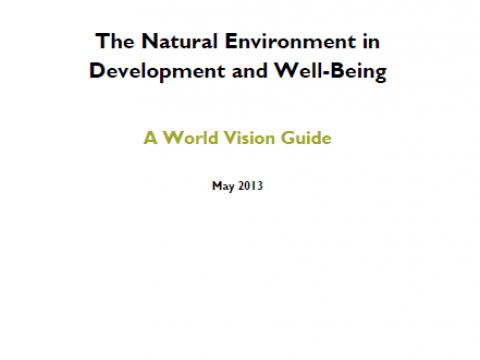The Natural Environment in Development and Well-Being
Download
World Vision, because of our child focus, has a greater obligation than most organisations to take an active interest in the health and resilience of natural resources and systems. It is not possible to sustain child well-being in the absence of a healthy, effective natural environment.
Children's well-being is built on both the well-being of the environments that surround them and the well-being of the people who care for, protect and guide them. In developing and poor contexts, the well-being of caregivers and communities is intimately dependent on the well-being of their own environments. It is possible, therefore, to significantly positively have an impact on both of these major determinants of children’s well-being by securing or increasing the well-being of natural environments.
The natural environment directly influences children’s well-being by playing significant roles in food and nutrition, water and sanitation, disease and immunity, physical and mental development, and hope and security. Indirectly, the natural environment influences well-being, especially the well-being of children in developing and in poor contexts, by facilitating caregivers’ capacity to provide for material needs, their ability to access educational and cultural resources for themselves and their families, and the quality of caregivers’ physical and mental health.
Empowering caregivers to strengthen their natural environments, and thereby strengthen livelihoods, food production and security of their resource base, empowers them to make life choices that most protect and enhance their children’s well-being. High levels of well-being reduce pressure for caregivers to make choices that harm children. Most families with the right knowledge and secure resources work to create the best life possible for their children.
A healthy natural environment is the foundation of successful long-term development. International development has evolved throughout its 50-plus years from a focus on saving lives alone to facilitating progress out of conditions of chronic vulnerability and poverty into conditions supporting ongoing, progressive well-being. In a world where the vast majority of people make their living from their environments and where climate change increasingly places all of civilisation at risk, securing healthy, productive environments is not optional but, rather, foundational to all developmental transformation – especially for the most vulnerable countries and communities.
Today, every person in the world lives in a state of environmental consequences, and these consequences will intensify if the state of the environment is not effectively – and very quickly – addressed. The purpose of this paper is to clearly describe the critical need to make functioning ecosystems a major development and relief priority. World Vision holds a responsibility to partner with our hundreds of local communities across the globe to capitalise on this window of opportunity to achieve multiple successes with each investment of money, time, effort and other resources.